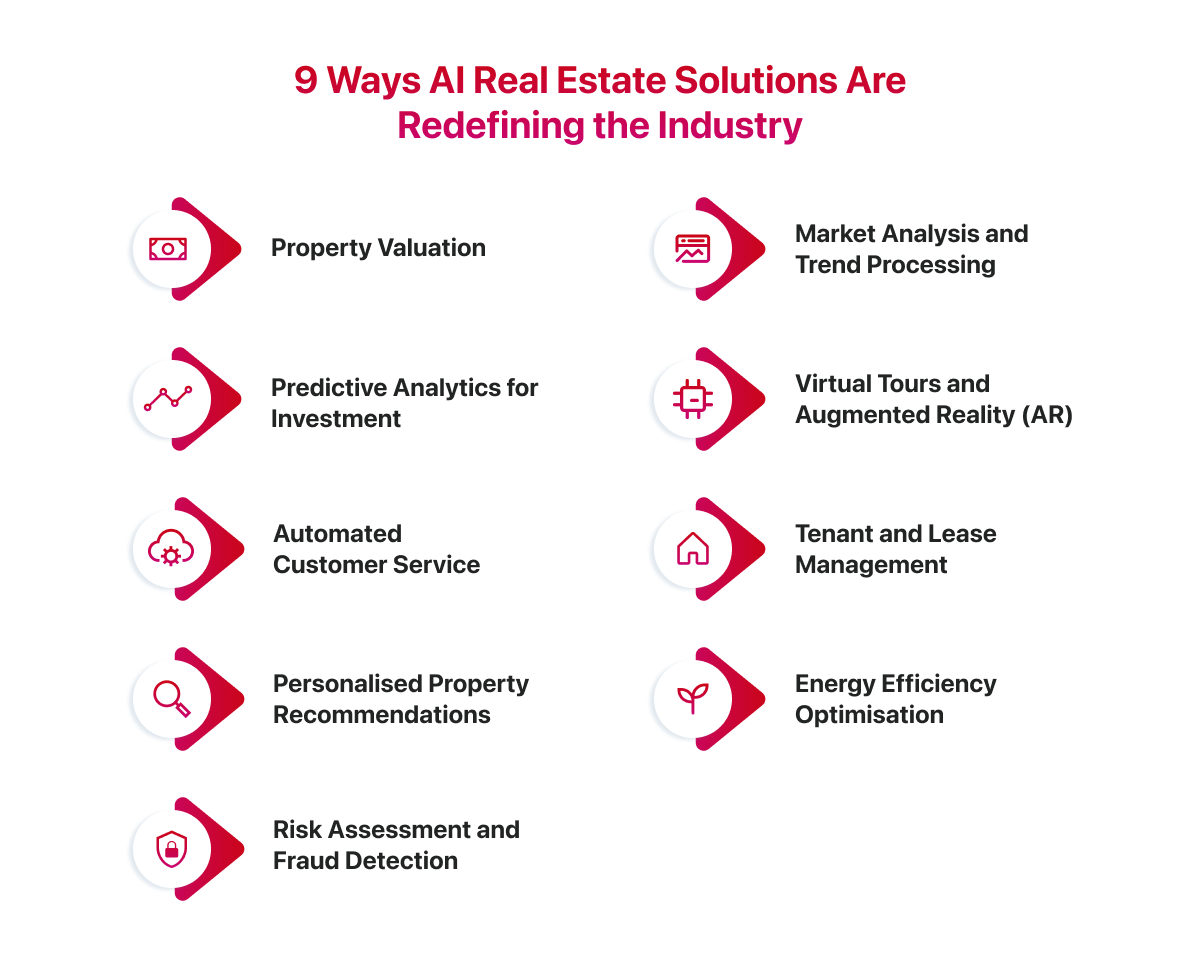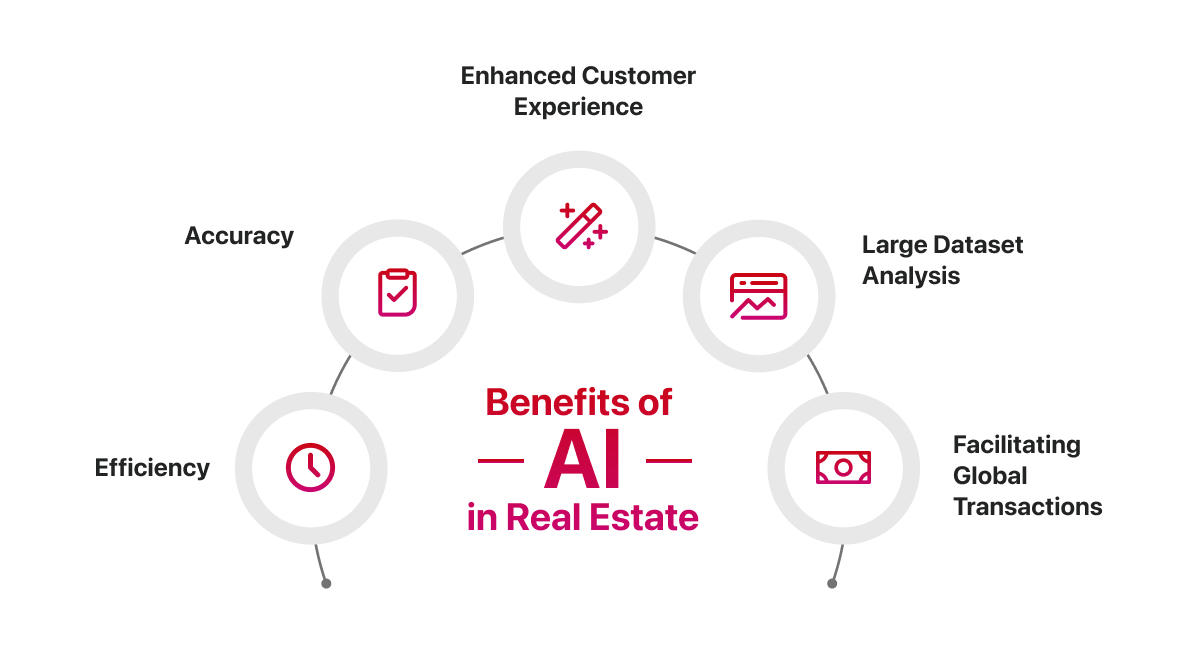Table of Contents
How AI is Reshaping the UK Real Estate Industry in 2024
Author

Date

Book a call
The beginning of 2024 has brought a wave of positive developments for the UK housing market. Recent reports indicate encouraging signs, including a slowdown in house price declines and a continued decrease in average mortgage rates for prospective homebuyers.
Following the heightened interest in AI and machine learning innovations throughout 2023, there is now a growing enthusiasm for these technologies within the PropTech sector. Clients and agents alike are increasingly drawn to AI-driven advancements that have the potential to elevate customer interactions, streamline marketing processes, and offer valuable data insights.
From analysing market trends to enhancing customer engagement, this article takes a look at how time-saving and revenue-boosting AI solutions are reshaping the real estate sector in the UK for the better.
Nine Ways AI Real Estate Solutions Are Redefining the Industry

Technology has transformed every aspect of real estate—from investment management to construction, operations, and portfolio management. The groundwork is set for the integration of Artificial Intelligence (AI), promising enhanced efficiency and reshaped industry practices.
1. Property Valuation
Property valuation is a crucial aspect of the real estate industry, and AI algorithms play a significant role in enhancing the accuracy and efficiency of this process. The utilisation of artificial intelligence in property valuation involves the analysis of diverse factors to estimate the fair market value of a property. This approach goes beyond traditional methods and incorporates advanced data analytics to provide a more nuanced and precise valuation. Here is a breakdown of the key elements involved in AI-based property valuation.
- Property Size: AI algorithms take into account the physical dimensions of the property, considering factors such as the total land area and the size of the built structure. By assessing these attributes, the algorithm can evaluate how they align with market preferences and standards, influencing the overall property value.
- Location: The geographical location of a property is a pivotal determinant of its value. AI algorithms analyse location-based data, considering proximity to amenities, schools, public transportation, and other relevant factors. Additionally, they may assess the neighbourhood's overall economic and social indicators to gauge the desirability of the location.
- Historical Sales Data: The algorithm incorporates historical sales data to identify patterns and trends in property values over time. By examining past transactions in the area, the AI system can identify appreciation or depreciation trends, enabling a more informed prediction of the property's current value.
- Average Price per Square Foot: A common metric used in property valuation, the average price per square foot provides a standardised measure for comparing properties. AI algorithms consider this metric within the context of the property's size and location to derive a more accurate valuation.
- Comparable Sales: AI algorithms leverage recent comparable sales data to draw parallels between the subject property and others in the vicinity. This comparative analysis helps in adjusting the valuation based on the similarities and differences between the properties, resulting in a more refined and precise estimate.
2. Predictive Analytics for Investment
The application of predictive analytics for investment in real estate is a powerful tool that leverages machine learning models to analyse historical data and uncover patterns, enabling investors to make more informed and strategic decisions.
- Historical Data Analysis: Machine learning algorithms process vast amounts of historical data related to real estate markets. This data includes information on property sales, rental yields, market trends, economic indicators, and various other factors influencing the real estate landscape. By examining patterns and correlations within this historical data, the algorithms can identify trends and relationships that may not be apparent through traditional analysis.
- Pattern Recognition: One of the strengths of machine learning is its ability to recognise complex patterns and relationships in data. These patterns could involve seasonality in property values, cyclicality in market demand, or correlations between economic indicators and real estate performance. The machine learning model learns from these historical patterns to make predictions about future market behavior.
- Predicting Future Trends: Once the machine learning model has been trained on historical data, it can be used to predict future trends in the real estate market. This could include forecasts for property values, rental yields, or overall market demand. Investors can gain valuable insights into potential opportunities or risks based on these predictions, allowing them to adjust their investment strategies accordingly.
- Anticipating Changes: Predictive analytics enables investors to anticipate changes in the real estate market before they occur. For example, if the model identifies a historical correlation between job growth in a specific area and an increase in property values, investors can anticipate a potential uptick in demand and adjust their investment portfolios accordingly. This proactive approach can give investors a competitive advantage in identifying emerging opportunities.
- Informed Investment Decisions: Armed with predictions and insights generated by machine learning models, investors can make more informed and data-driven decisions. This includes decisions on where to invest, when to buy or sell, and how to diversify their portfolios. By integrating predictive analytics into their decision-making processes, investors can potentially enhance their returns and mitigate risks.
3. Automated Customer Service
The integration of AI in the real estate sector has facilitated the development of automated customer service systems, particularly through the use of AI-powered chatbots. These virtual assistants are designed to streamline communication, enhance customer experience, and provide immediate support.
- AI-powered Chatbots: AI-powered chatbots are computer programs designed to simulate conversation with users. In the context of real estate, these chatbots serve as virtual assistants capable of handling various customer service tasks. They are programmed to understand and respond to user inquiries in a manner that simulates natural language interaction.
- Frequently Asked Questions (FAQs): AI chatbots are equipped to handle frequently asked questions about properties, real estate transactions, and related information. By utilising natural language processing (NLP), these bots can understand the intent behind user queries and provide relevant and accurate responses. This helps in addressing common concerns and queries promptly without requiring human intervention.
- Property Inquiries: Virtual assistants can assist potential buyers or tenants by providing information about available properties, including details on size, amenities, location, and pricing. Users can interact with the chatbot to inquire about specific features, property specifications, or any other information they seek. This instant access to property details contributes to a more efficient and convenient customer experience.
- Scheduling Property Showings: AI-powered chatbots can go beyond information provision and assist in scheduling property showings. Users can express their interest in visiting a property, and the chatbot can facilitate the scheduling process by checking availability, coordinating with real estate agents, and confirming appointments. This automation accelerates the booking process and improves customer engagement.
4. Personalised Property Recommendations
The integration of AI in real estate extends to providing personalised property recommendations, enhancing the property search experience for users. This functionality relies on the analysis of user preferences and behaviors, allowing AI systems to tailor recommendations based on individual requirements.
- User Preferences Analysis: AI systems leverage data analytics to analyse the preferences and behaviors of users engaging with a real estate platform. This analysis includes studying the types of properties users search for, specific features they prioritise, preferred locations, budget constraints, and any other relevant criteria.
- Machine Learning Algorithms: Machine learning algorithms are employed to process and interpret the vast amount of data generated by user interactions. These algorithms learn patterns and correlations within the data, identifying trends in user behaviour and preferences over time. The more users engage with the platform, the better the AI becomes at understanding their individual tastes.
- Personalised Recommendations: Based on the insights gained from user preferences, the AI system generates personalised property recommendations. For example, if a user frequently searches for three-bedroom apartments with a balcony in a specific neighbourhood, the AI will prioritise and recommend listings that match these criteria. This personalised approach streamlines the property search process, presenting users with options that align closely with their desires.
- Dynamic Adaptation: The AI system is designed to adapt dynamically as user preferences evolve. If a user's search patterns change or they indicate new preferences, the system will adjust its recommendations accordingly. This flexibility ensures that the recommendations remain relevant and in sync with the user's current needs and preferences.
- Efficient Property Search: Personalised property recommendations significantly improve the efficiency of the property search process. Users are presented with options that are more likely to meet their criteria, reducing the time and effort required to sift through numerous listings. This personalised approach adds a level of convenience and customisation to the property search experience.
- Increased User Engagement: Tailoring recommendations to individual preferences enhances user engagement with the real estate platform. Users are more likely to explore suggested listings that align with their interests, leading to increased interaction with the platform. This engagement can result in a more satisfying user experience and may contribute to user retention.
5. Risk Assessment and Fraud Detection
The incorporation of AI in real estate extends to risk assessment and fraud detection, providing a valuable tool for evaluating the integrity and reliability of information in real estate transactions. The capabilities of AI in this context involve the analysis of multiple factors to identify potential risks, discrepancies, and instances of fraud.
- Data Consistency Analysis: AI systems analyse vast amounts of data related to real estate transactions, including contract details, financial information, and property documentation. By examining the consistency of information across different documents and data sources, AI can identify potential discrepancies or irregularities that may indicate a higher risk of fraudulent activity.
- Document Verification: AI can assist in the verification of documents involved in real estate transactions. This includes checking the authenticity of contracts, deeds, and other critical documents. By employing image recognition and document analysis, AI systems can flag discrepancies, inconsistencies, or potential forgeries that may signal fraudulent activities.
- Behavioural Analysis: AI systems can analyse user behaviour and transactional patterns to detect anomalies that might suggest fraudulent intent. Unusual transaction timings, multiple transactions from a single source in a short period, or other atypical patterns can trigger alerts for further investigation.
- Identification of Red Flags: AI is programmed to identify specific red flags associated with fraudulent activities. These may include sudden changes in ownership information, irregularities in payment patterns, discrepancies in property valuation, or inconsistencies in financial documentation. These red flags serve as indicators that prompt a more thorough examination of the transaction.
- Real-time Monitoring: AI enables real-time monitoring of transactions, providing an immediate response to potential risks. This proactive approach allows for the swift identification and mitigation of fraudulent activities as they occur, minimising the impact on the involved parties.
6. Market Analysis and Trend Processing
AI's role in market analysis and trend processing within the real estate sector is instrumental in providing valuable insights and actionable information for real estate professionals and investors. This involves the utilisation of advanced algorithms to process large datasets, identify patterns, and draw meaningful conclusions regarding market dynamics.
- Data Processing and Aggregation: AI algorithms are capable of processing vast amounts of data from diverse sources, including property listings, historical sales records, economic indicators, demographic data, and more. By aggregating this information, AI creates a comprehensive and dynamic dataset that serves as the foundation for market analysis.
- Pattern Recognition and Analysis: Machine learning algorithms within AI systems excel at recognising patterns and correlations within complex datasets. In the context of real estate, these patterns may include seasonal fluctuations in property prices, correlations between economic indicators and real estate performance, or shifts in demand based on demographic changes. AI analyzes these patterns to extract meaningful insights.
- Fluctuations in Property Prices: AI can assess and predict fluctuations in property prices by considering various factors such as economic conditions, interest rates, and local market conditions. This information is valuable for both buyers and sellers in making informed decisions about property transactions.
- Emerging Opportunities Identification: AI helps in identifying emerging opportunities in the real estate market. This could include areas experiencing rapid development, upcoming neighbourhoods with potential for growth, or specific property types gaining popularity. Investors and professionals can leverage this information to capitalise on emerging trends.
- Decision Support for Professionals and Investors: Real estate professionals and investors can use the insights generated by AI for decision support. Whether it's determining optimal pricing strategies, identifying investment opportunities, or understanding market conditions for strategic planning, AI-driven market analysis serves as a valuable tool in the decision-making process.
- Dynamic and Real-time Analysis: AI's ability to process data in real-time ensures that market analysis remains dynamic and responsive to changing conditions. This real-time analysis is crucial for staying abreast of rapid market changes and making timely decisions.
7. Virtual Tours and Augmented Reality (AR)
AI-driven virtual tours and augmented reality (AR) applications have revolutionised the way potential buyers experience and interact with real estate properties. These technologies leverage advanced AI capabilities, such as computer vision and image recognition, to create immersive and interactive experiences.
- Virtual Tours with Computer Vision: AI utilises computer vision to analyze and interpret visual information from images or videos. In the context of virtual tours, computer vision is employed to understand the layout, features, and details of a property. Virtual tours enable potential buyers to navigate through a property as if they were physically present. AI processes images or videos of the property to create a seamless and immersive experience, allowing users to explore each room, corner, and detail virtually.
- Image Recognition for Property Features: Image recognition technology within AI systems identifies and labels specific features and objects within the property. This includes recognising different rooms, furniture, architectural elements, and other details. By incorporating image recognition, virtual tours can provide users with detailed information about the property. Users can receive instant details about specific features, such as the type of flooring, appliances in the kitchen, or the style of fixtures in bathrooms.
- Virtual Staging for Visualisation: Virtual staging involves digitally enhancing or modifying a property's appearance to showcase its potential. AI algorithms can virtually stage a property with different furniture styles, layouts, or design elements. Potential buyers can visualize how a property would look with different furnishings or design choices. This feature helps buyers better understand the potential of a space and aids in decision-making.
- Augmented Reality Applications: Augmented reality overlays digital information onto the real-world environment. In real estate, AR applications can be used to enhance the viewing experience by providing additional information or visual elements. AR allows users to point their devices at a property or specific areas within it, triggering additional information, 3D models, or virtual annotations. This interactive exploration enhances the understanding of the property's features.
- Remote Property Viewing: Virtual tours and AR applications make it possible for potential buyers to explore properties remotely. This is especially valuable for buyers who may be located in different cities or countries, allowing them to virtually tour a property without physically visiting. By offering remote viewing options, buyers can narrow down their choices more efficiently, saving time and travel costs. This is particularly beneficial in competitive real estate markets.
- Enhanced Marketing and Sales: Virtual tours and AR experiences provide engaging marketing materials for real estate listings. This interactive content can attract more potential buyers and enhance the overall visibility of a property. The immersive nature of virtual tours and AR experiences can contribute to increased sales conversion rates. Buyers who have a comprehensive understanding of a property through these technologies are more likely to make informed decisions.
8. Tenant and Lease Management
AI plays a significant role in tenant and lease management within the real estate industry, providing automation and data-driven insights that enhance efficiency and decision-making.
- Communication Automation: AI-powered systems can automate communication with tenants, sending notifications for rent reminders, maintenance requests, or important updates. This automation streamlines communication processes and ensures timely and consistent information delivery.
- Lease Agreement Tracking: AI facilitates the organisation and management of lease agreements and related documents. By employing document recognition and classification, AI systems can accurately identify and categorise lease documents, making it easier to track key terms, conditions, and expiration dates.
- Rent Payment Analysis: AI systems can analyse the rent payment history of tenants to identify patterns and trends. This analysis includes assessing factors such as payment punctuality, frequency of late payments, and any consistent issues that may arise. AI uses predictive modeling to forecast future rent payment behavior based on historical data. This helps property managers and landlords anticipate potential challenges and implement strategies to maintain consistent cash flow.
- Issue Identification and Resolution: AI can identify anomalies or irregularities in tenant behaviour or payment patterns. For example, if a tenant who has consistently paid rent on time starts displaying irregular payment behaviour, AI can flag this as an anomaly for further investigation. Some AI systems are equipped to automate certain issue resolution processes. For instance, addressing common tenant inquiries, scheduling maintenance tasks, or facilitating lease renewals can be automated, freeing up property management resources.
- Efficient Lease Renewals: AI analyses tenant data to inform lease renewal strategies. By considering factors such as tenant satisfaction, payment history, and market conditions, AI helps property managers make informed decisions about lease renewals, potentially improving tenant retention rates.
9. Energy Efficiency Optimisation
AI's role in energy efficiency optimisation within the real estate sector is crucial for minimising environmental impact and reducing operational costs. By analysing historical energy usage data and utilising advanced algorithms, AI can identify patterns, recommend optimisations, and contribute to more sustainable and cost-effective property management.
- Historical Energy Usage Analysis: AI systems gather and analyse historical energy usage data from various sources within a property. This includes data from smart meters, HVAC systems, lighting systems, and other energy-consuming devices. AI algorithms identify patterns and trends in historical energy consumption. By understanding how energy is used over time, the system gains insights into the property's typical energy usage behavior.
- Recommendation for Adjustments: Based on the analysis of historical data, AI provides recommendations for optimising energy usage. These recommendations can include adjustments to lighting schedules, heating, ventilation, and air conditioning (HVAC) systems, and other energy-consuming devices. AI may also offer insights into occupant behavior that affects energy consumption. For example, it may identify periods of high energy usage coinciding with certain occupancy patterns and suggest adjustments to align energy consumption with actual needs.
- Dynamic HVAC System Control: AI can dynamically control HVAC systems to adapt to changing conditions. By considering factors such as external weather, occupancy levels, and time of day, the system optimizes temperature settings to reduce energy consumption while maintaining occupant comfort. Some AI systems use predictive analytics to anticipate changes in temperature and occupancy, adjusting HVAC settings proactively to achieve optimal energy efficiency.
- Lighting Control Strategies: AI integrates with smart lighting systems to optimize lighting schedules and intensity levels. It may recommend adjustments based on natural light availability, occupancy patterns, and time of day to minimise unnecessary energy consumption. AI can also leverage occupancy sensors to control lighting in real-time, ensuring that lights are only active in areas where they are needed, thus reducing energy waste.
- Cost Savings and Environmental Impact: Energy efficiency optimizations recommended by AI contribute to operational cost savings for property owners and managers. By reducing energy consumption, property owners can lower utility bills and operational expenses. The reduction in energy consumption not only leads to cost savings but also aligns with environmental sustainability goals by minimising the carbon footprint associated with property operations.
- Integration with Smart Building Systems: AI often integrates with smart building systems that include sensors, meters, and control systems. This holistic approach allows AI to consider multiple factors simultaneously and make more informed recommendations for overall energy efficiency.
Benefits of AI in Real Estate

The benefits of AI in real estate have a far-reaching impact on various stakeholders within the industry, contributing to improvements for real estate professionals, investors, buyers and tenants, property managers, and environmental sustainability advocates.
- Efficiency: AI automates routine and time-consuming tasks, such as data entry, document processing, and communication. This automation streamlines workflows, allowing real estate professionals to focus on more strategic aspects of their roles. Automation enhances the efficiency of various processes, from property management to customer service. This results in faster turnaround times and increased productivity across different functions within the real estate industry.
- Accuracy: AI algorithms analyse a multitude of factors to provide more accurate property valuations. This includes considerations such as property size, location, historical sales data, and current market trends. The data-driven approach reduces the likelihood of errors associated with manual valuation methods.
- Enhanced Customer Experience: AI facilitates personalised communication with clients by analysing their preferences, behaviours, and needs. Virtual assistants and chatbots powered by AI can provide tailored information, property recommendations, and assistance, creating a more engaging and satisfactory experience for potential buyers and tenants.
- Large Dataset Analysis: LLMs can analyse large datasets containing information in different languages. This capability is beneficial for real estate professionals operating in multicultural and multilingual environments, helping them extract valuable insights from a broader range of sources.
- Facilitating Global Transactions: LLMs contribute to smoother communication and understanding in global real estate transactions. They enable professionals to overcome language barriers, ensuring that information is accurately conveyed and received, thus facilitating more efficient and effective cross-border dealings.
Future of AI in the UK Real Estate Landscape
In shaping the future landscape of the real estate industry, the strategic and responsible harnessing of AI stands as a linchpin for innovation and efficiency. As market standards evolve to accommodate AI-driven technologies, regulations are poised to play a crucial role, not only in ensuring ethical practices but also in establishing a framework for fair competition. Environmental regulations are becoming increasingly integral, aligning with the industry's commitment to sustainability.
Staying informed and planning accordingly will be paramount for industry stakeholders, allowing them to adapt to the dynamic intersection of AI and real estate.
AI-powered real estate app development is set to offer benefits such as personalised user experiences, streamlined processes, and increased accessibility. Embracing these advancements and navigating the evolving regulatory landscape will undoubtedly define the future success of the real estate sector in this era of AI.






